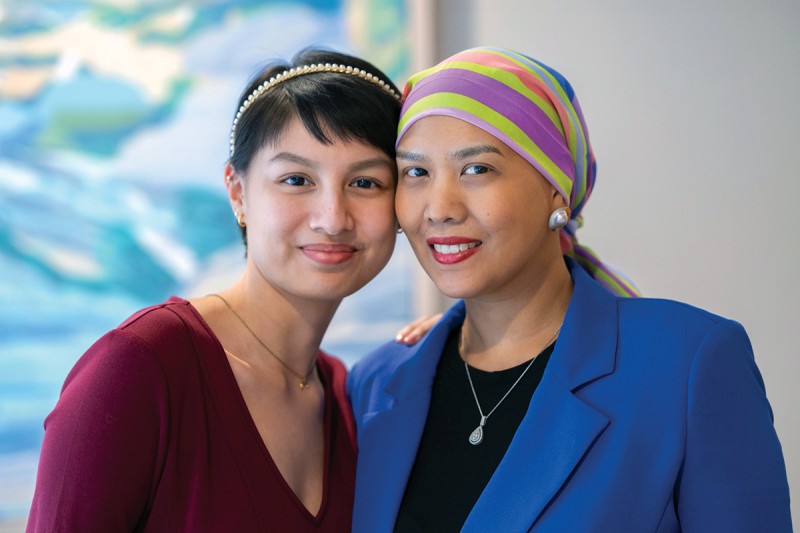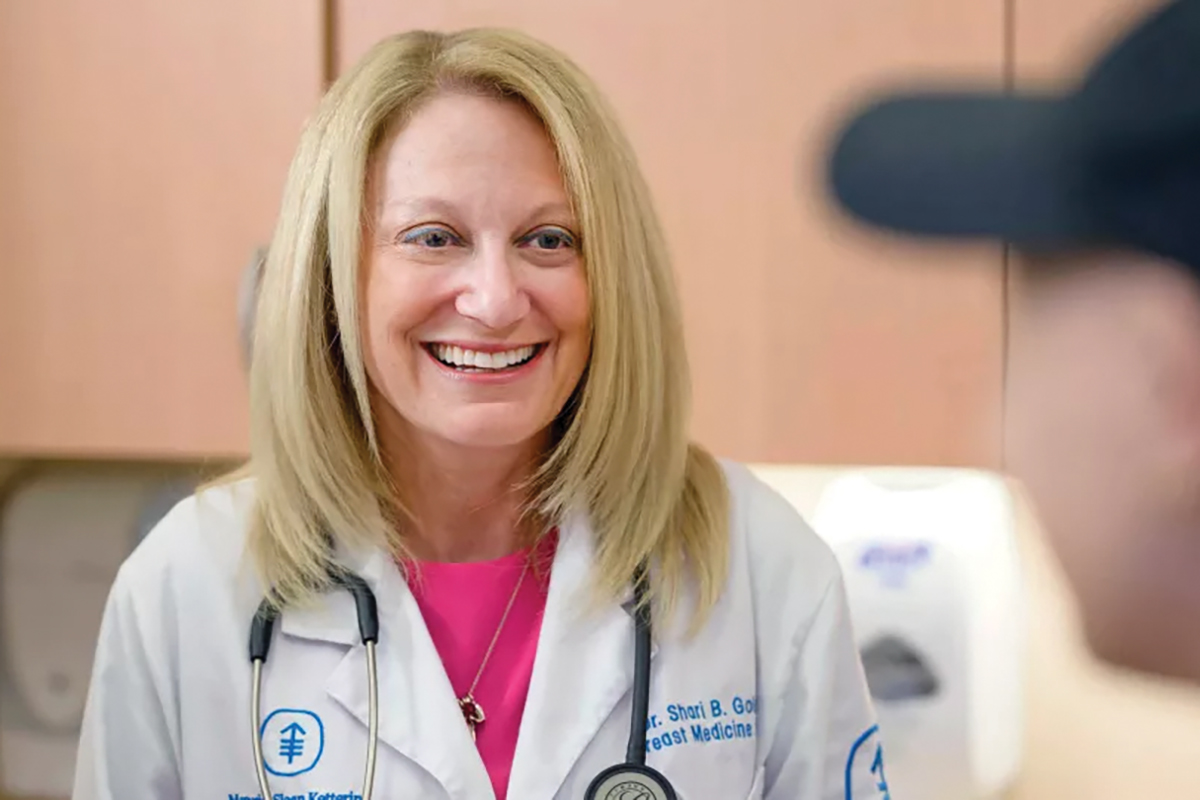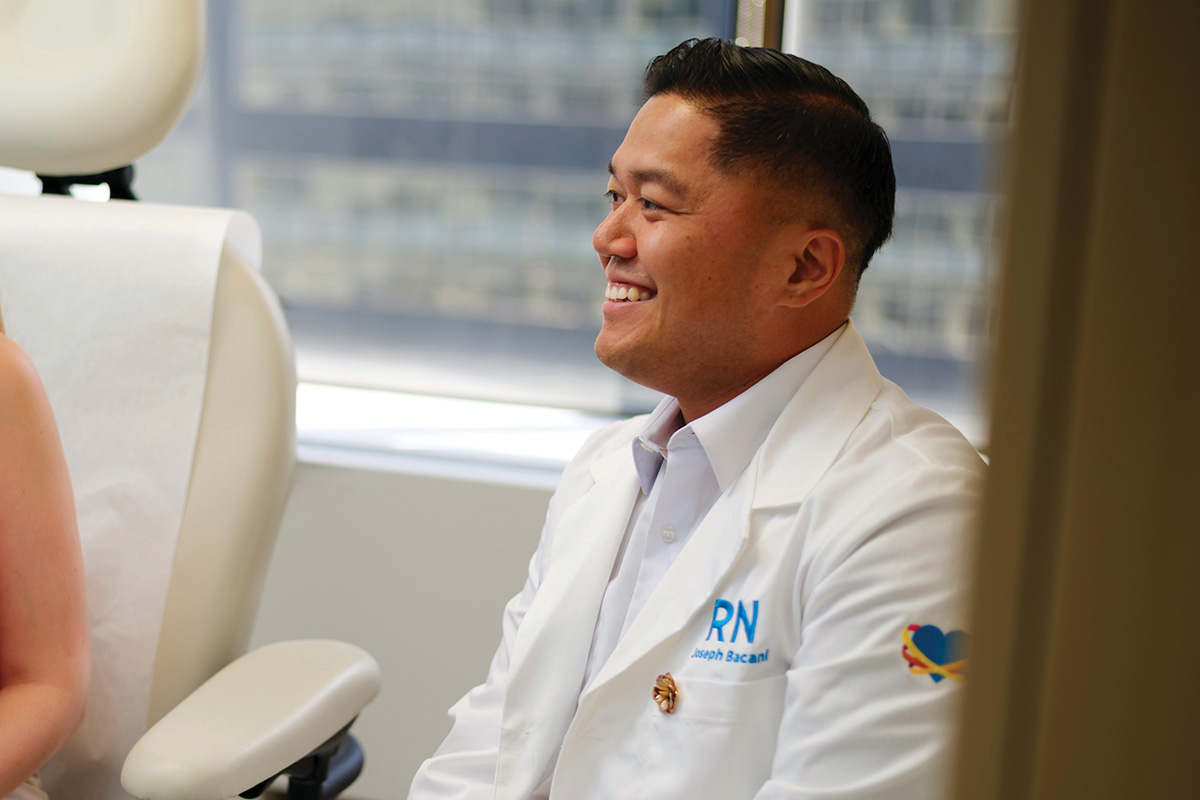
When 26-year-old Jo Luzarraga was diagnosed with breast cancer in Manila, Philippines, her older sister Jan Claire swung into action.
“I told her, you’re moving to Queens, New York, to live with me and my daughter and my partner,” says Jan Claire, who is 40. “And you’re going to be treated at Memorial Sloan Kettering Cancer Center.”
Jan Claire supported her younger sister as she underwent chemotherapy, surgery, and radiation to treat triple negative breast cancer, which is a challenging subtype of the disease.
While being treated at MSK, Jo learned that she carries the BRCA1 mutation, a genetic trait passed down through families that puts people at much greater risk for breast, ovarian, and other cancers.
Testing revealed that her older sister Jan Claire, also carries the BRCA1 mutation.
In a heartbreaking blow, just as Jo was looking forward to finishing treatment, older sister Jan Claire learned she also had BRCA1-related triple negative breast cancer.
“I was in a state of shock,” says Jan Claire. “But I had seen the amazing care everyone at MSK gave my younger sister. I knew I would be taken care of every step of the way.”
Now both sisters say their bond is stronger than ever. “Jan Claire took care of me during my cancer journey,” says Jo, “and I’m going to do the same for her.”
Specialized Cancer Care for Adults 50 and Younger
Because both sisters are under 45, their care is coordinated through the Young Women With Breast Cancer (YWBC) program.
It is part of a trio of MSK programs with specialized expertise dedicated to the needs of younger adults. The group also includes the Center for Young Onset Colorectal and Gastrointestinal Cancer and the Lisa and Scott Stuart Center for Adolescent and Young Adult Cancers.
The Rising Trend of Cancer Rates and Deaths in People Under 50
These programs were developed in part to deal with a disturbing rise in the number of people under 50 — including people in their teens and twenties — who are diagnosed with a variety of cancer types, including breast, colorectal, prostate, and lung.

Many factors contribute to this. Some patients have not yet reached the age for recommended routine screenings such as mammograms and colonoscopies. Therefore, their cancer is detected at a more advanced stage, when outcomes are worse. Cancer in young patients is also sometimes more aggressive.
Finding out why more young people are being diagnosed with cancer is a major focus of MSK programs. The three specialized centers are also devoted to helping people whose lives have been upended.
“These patients face unique challenges because of the time of life when they are diagnosed,” says breast medical oncologist Shari Goldfarb, MD, who leads the YWBC program and treats the Luzarraga sisters. “We look to address fertility, family planning, sexual function, self-identity, interpersonal relationships, career building, and more, often with the help of social workers.”
The Importance of Family Planning and Fertility Preservation for Younger People With Cancer
As a woman in her mid-20s, Jo says, “It was very comforting to have my care team raise the issue of fertility. I’m glad to know resources are there if I want them.” She also appreciated help navigating the finances of paying for her cancer care, a particularly daunting concern for younger people.
After her diagnosis, big sister Jan Claire was struggling with her own challenges. She says, “I’m at a different stage of life than Jo, as a 40-year-old parent of a young daughter who is living with my partner. Dr. Goldfarb and her team really helped me deal with the anxieties of working while being a mom in cancer treatment.”
That balancing act is helped by team members including Alanna Jamner, the research coordinator for the YWBC program. “I look to make sure patient care is streamlined, so for example if laboratory work is scheduled for one day and an MRI on the next, I’ll reschedule so patients can get everything done at once,” she says. “We work behind the scenes to help reduce stress for patients and their families to help them get the best care possible.”
Jan Claire says it’s invaluable “to have a medical team that understands all the things you’re juggling. I feel they just take care of you differently at MSK.”
How One Nurse’s Own Cancer Journey Helps Him Connect With Patients
Empathetic care is also a goal of Joe Bacani, RN. He is a nurse in the Center for Young Onset Colorectal and Gastrointestinal Cancer.
The center, co-founded by gastrointestinal oncologist Andrea Cercek, MD, and gastroenterologist Robin Mendelsohn, MD, was the first in the world devoted to the specific needs of younger adult patients and has seen more than 4,000 patients since its founding in 2018. Bacani has been there from the beginning.
“I have what I call an unfortunate advantage,” says Bacani. “I was a blood cancer patient when I was 18 years old. I tell patients I don’t know exactly what they’re going through, but I’ve sat in the seat where they’re sitting.”

Bacani says his own experience “definitely makes my work personal. I can connect with patients from the get-go. I’m now 39. Many of the people I care for are my peers. And some are actually young enough to be my children.”
Caring for the whole person is paramount, says Bacani. “Obviously we are focused on taking care of you as a patient. But we’re also taking care of you as a mother or potential mother, as a spouse, as an employee, as a student. All the aspects that make that person who they are.”
For Jon Tenan, “one of my biggest goals in life was to be a good dad.” He came to MSK with a life-threatening stage 4 colorectal cancer diagnosis at 37. With a wife and two children under 5 years old, he says, “we were planning for life without me, which was more heartbreaking than anything I hopefully will ever do again.”
Jon credits his MSK care team, led by gastrointestinal medical oncologist, Zsofia Stadler, MD, with saving his life. He also relied on clinical social worker Hadley Maya, LCSW.
Addressing the Unique Challenges Faced by Younger Cancer Patients
“Many younger patients are the first person in their network of friends to face cancer, and it can be really isolating,” says Maya. “Some want advice on how to navigate dating with cancer. Others have their own children and also have parents who want to play an active role in their treatment.”
For Jon, Maya was a vital resource. “Hadley was very helpful in figuring out how my wife and I could talk to our children in ways that made it digestible,” he says. “Like, ‘Daddy has an illness called cancer, and we’re working with the best doctors in the world to make it better.’ ”
A major reason younger patients come to MSK is for expertise — and answers.
“Younger people come to us and ask, ‘Why did this happen to me?’ ” says Lisa DeAngelis, MD, MSK’s Chief Physician Executive. “While we can’t always answer that question, we do have unprecedented insights into the underlying biology of many tumors, which can guide testing for a genetic trait that predisposes to a cancer appearing in a young person. This information can also guide treatment and assure better outcomes.”
There are almost 2,000 interventional clinical trials testing novel treatments at MSK that are designed and led by the leaders of their respective fields.
“There is no place that comes close to that portfolio,” says Dr. DeAngelis.
It’s this expertise that has given both Luzarraga sisters comfort and optimism. Jo has just completed active treatment and is feeling well.
Jan Claire expects to finish her therapy in the spring.
For nurse Bacani, helping younger patients facing cancer feels like his destiny. “I know this sounds corny,” he says, “but after going through my own cancer journey, I knew that if my experience could touch one person then my purpose in staying here on Earth has been fulfilled.”
Dr. Cercek’s research is supported by the MSK donor community, including Bob and Anna Lou Schaberg and the Frechette Family Foundation.
Additional support for the research collaborations was provided by the MSK donor community, including Scott M. and Lisa G. Stuart.
Dr. DeAngelis holds the Scott M. and Lisa G. Stuart Chair.
Dr. Cercek holds The Ford Family Chair.